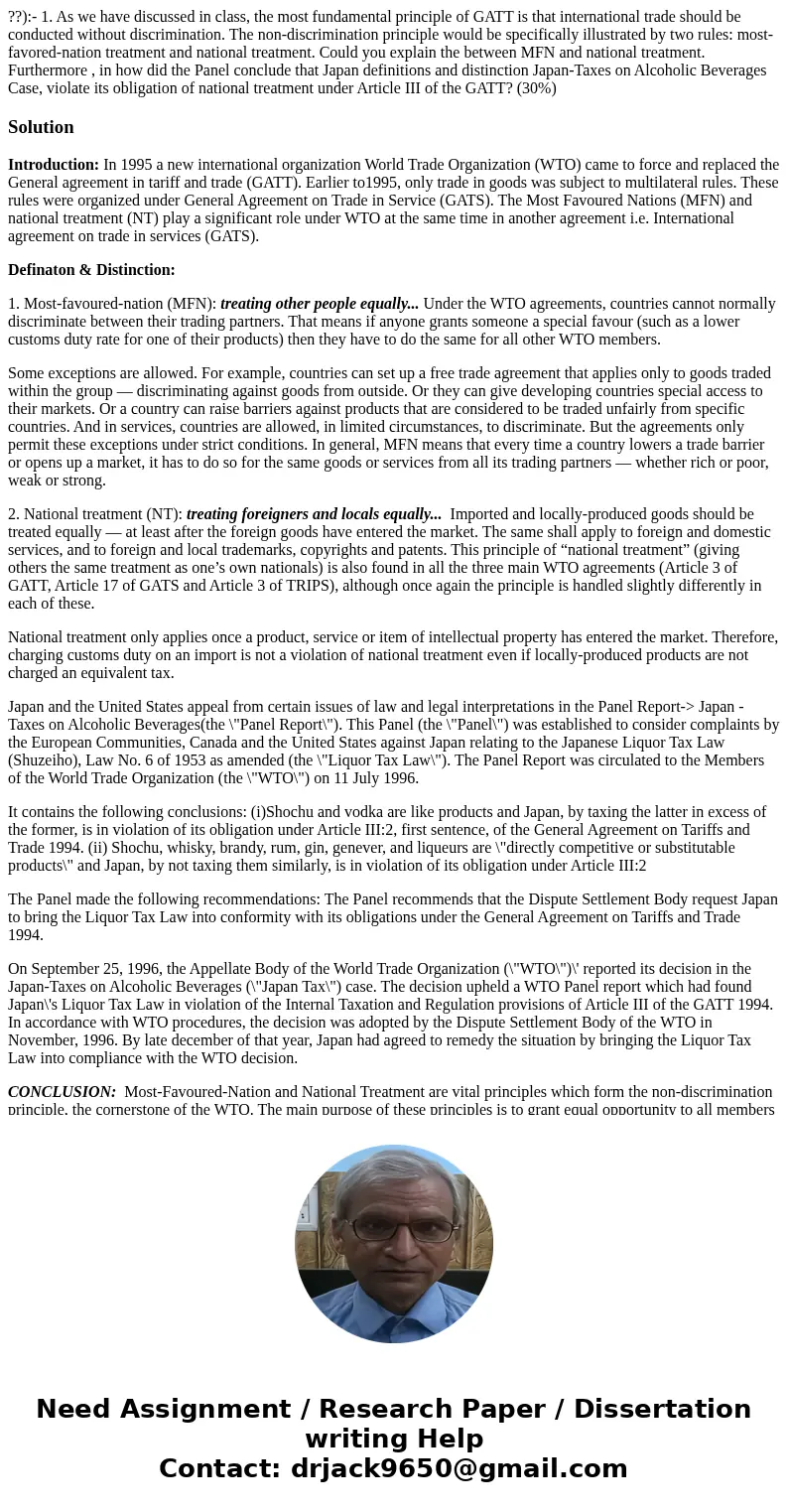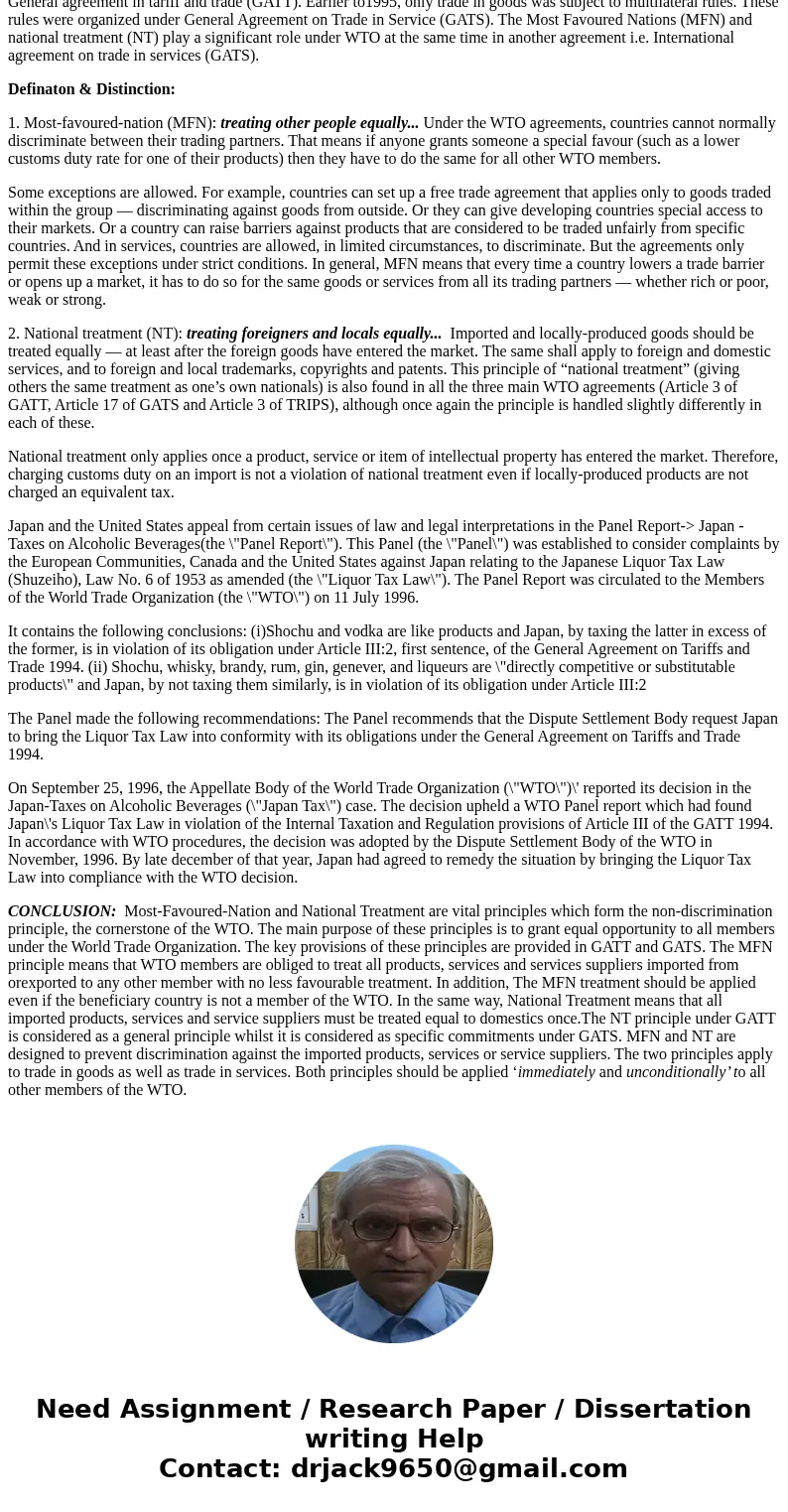1 As we have discussed in class the most fundamental princi
Solution
Introduction: In 1995 a new international organization World Trade Organization (WTO) came to force and replaced the General agreement in tariff and trade (GATT). Earlier to1995, only trade in goods was subject to multilateral rules. These rules were organized under General Agreement on Trade in Service (GATS). The Most Favoured Nations (MFN) and national treatment (NT) play a significant role under WTO at the same time in another agreement i.e. International agreement on trade in services (GATS).
Definaton & Distinction:
1. Most-favoured-nation (MFN): treating other people equally... Under the WTO agreements, countries cannot normally discriminate between their trading partners. That means if anyone grants someone a special favour (such as a lower customs duty rate for one of their products) then they have to do the same for all other WTO members.
Some exceptions are allowed. For example, countries can set up a free trade agreement that applies only to goods traded within the group — discriminating against goods from outside. Or they can give developing countries special access to their markets. Or a country can raise barriers against products that are considered to be traded unfairly from specific countries. And in services, countries are allowed, in limited circumstances, to discriminate. But the agreements only permit these exceptions under strict conditions. In general, MFN means that every time a country lowers a trade barrier or opens up a market, it has to do so for the same goods or services from all its trading partners — whether rich or poor, weak or strong.
2. National treatment (NT): treating foreigners and locals equally... Imported and locally-produced goods should be treated equally — at least after the foreign goods have entered the market. The same shall apply to foreign and domestic services, and to foreign and local trademarks, copyrights and patents. This principle of “national treatment” (giving others the same treatment as one’s own nationals) is also found in all the three main WTO agreements (Article 3 of GATT, Article 17 of GATS and Article 3 of TRIPS), although once again the principle is handled slightly differently in each of these.
National treatment only applies once a product, service or item of intellectual property has entered the market. Therefore, charging customs duty on an import is not a violation of national treatment even if locally-produced products are not charged an equivalent tax.
Japan and the United States appeal from certain issues of law and legal interpretations in the Panel Report-> Japan - Taxes on Alcoholic Beverages(the \"Panel Report\"). This Panel (the \"Panel\") was established to consider complaints by the European Communities, Canada and the United States against Japan relating to the Japanese Liquor Tax Law (Shuzeiho), Law No. 6 of 1953 as amended (the \"Liquor Tax Law\"). The Panel Report was circulated to the Members of the World Trade Organization (the \"WTO\") on 11 July 1996.
It contains the following conclusions: (i)Shochu and vodka are like products and Japan, by taxing the latter in excess of the former, is in violation of its obligation under Article III:2, first sentence, of the General Agreement on Tariffs and Trade 1994. (ii) Shochu, whisky, brandy, rum, gin, genever, and liqueurs are \"directly competitive or substitutable products\" and Japan, by not taxing them similarly, is in violation of its obligation under Article III:2
The Panel made the following recommendations: The Panel recommends that the Dispute Settlement Body request Japan to bring the Liquor Tax Law into conformity with its obligations under the General Agreement on Tariffs and Trade 1994.
On September 25, 1996, the Appellate Body of the World Trade Organization (\"WTO\")\' reported its decision in the Japan-Taxes on Alcoholic Beverages (\"Japan Tax\") case. The decision upheld a WTO Panel report which had found Japan\'s Liquor Tax Law in violation of the Internal Taxation and Regulation provisions of Article III of the GATT 1994. In accordance with WTO procedures, the decision was adopted by the Dispute Settlement Body of the WTO in November, 1996. By late december of that year, Japan had agreed to remedy the situation by bringing the Liquor Tax Law into compliance with the WTO decision.
CONCLUSION: Most-Favoured-Nation and National Treatment are vital principles which form the non-discrimination principle, the cornerstone of the WTO. The main purpose of these principles is to grant equal opportunity to all members under the World Trade Organization. The key provisions of these principles are provided in GATT and GATS. The MFN principle means that WTO members are obliged to treat all products, services and services suppliers imported from orexported to any other member with no less favourable treatment. In addition, The MFN treatment should be applied even if the beneficiary country is not a member of the WTO. In the same way, National Treatment means that all imported products, services and service suppliers must be treated equal to domestics once.The NT principle under GATT is considered as a general principle whilst it is considered as specific commitments under GATS. MFN and NT are designed to prevent discrimination against the imported products, services or service suppliers. The two principles apply to trade in goods as well as trade in services. Both principles should be applied ‘immediately and unconditionally’ to all other members of the WTO.


 Homework Sourse
Homework Sourse